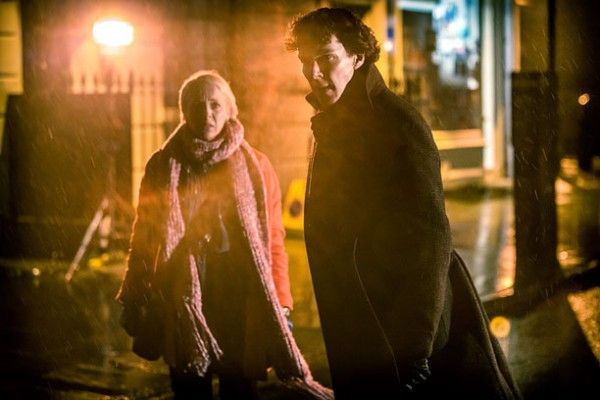With Sherlock (which airs on Masterpiece on PBS), the contemporary reinvention of the Arthur Conan Doyle classics, written and created by Steven Moffat and Mark Gatiss, Sherlock Holmes (Benedict Cumberbatch) and Dr. John Watson (Martin Freeman) face enemies, solve crimes and try to figure out how to navigate their own friendship. After Sherlock barely survived Moriarty (Andrew Scott) in Season 2, Watson had to survive not only marriage to Mary (Amanda Abbington), but what her secrets would mean for their future. And even though fans might have to wait another couple of years to see where things are going next, I know that I sure can’t wait to learn what twists and turns will be in store.
During this recent exclusive interview with Collider, creator/writer Steven Moffat talked about how awesome it’s been to have people embrace the show so much, why viewers didn’t see the twists with Mary, adding the female perspective to Sherlock Holmes, where these characters might be going next, and the long term plan with Moriarty. Check out what he had to say after the jump, and be aware that there are some spoilers.
Collider: Knowing that Sherlock Holmes is one of the most commonly used characters in cinema, is it really exciting and fun to know that people really love this version and think it’s one of the best versions that’s been doing?
STEVEN MOFFAT: Well, it’s awesome for Mark and me. As you say in America, it’s awesome. Awesome is a great word. Of course it is! We are Sherlock Holmes fanboys. We are seriously into Sherlock Holmes. That’s why we’re doing it. So, to get to do a version, at all, is an amazing treat for us. It’s just a fanboy treat. I guess I can say – crippled with shame that I’m being immodest – that it’s a huge, massive success, and people do seem to think it’s one of the best versions. We totaled up the awards the other day and it’s gotten over 60, which is quite a lot for nine films. That’s just amazing! It happened to incredibly fast.
We slightly feel as though we just arrived at the top of the mountain. We had barely finished making the first [season], and we were just very excited by the fact that we’d finally gotten to put 221B on a door, and Mark and I could be photographed next to it. We were just being ridiculous children. And they brought the broadcast date radically forward, so we had about three weeks. We had no time. And then, the first episode hit so huge that it was already a national institution, by the time the second episode was on. We had no moment of clamoring toward the light. It was just there. Benedict Cumberbatch could and did walk through the streets of London, in that coat and with Martin [Freeman]. Now, the idea that we could do that now, with a long lens and without causing a riot, is ridiculous. Suddenly, Benedict Cumberbatch went from being absolutely unknown to being the most famous man in London.
The twists with Mary and with Moriarty were so much fun.
MOFFAT: The Moriarty thing is obviously a complete cheat, but it’s still fun. The Mary thing is interesting. The reason you didn’t spot it is because you liked her. We put the audience in the position of Sherlock Holmes. All the evidence is absolutely under your nose. It’s all there. She’s far too calm under pressure. No human being would be like that. She immediately likes Sherlock Holmes, which is the sure sign of a maniac. But all the audience is thinking is, “Well, thank god, she’s not a drag. Thank god, she’s fun,” instead of thinking, “What sort of person is that? That’s not a nurse. She’s something other than a nurse.” So, when she turns around and points a gun at Sherlock, it’s the two things you really want. It’s a surprise, but you also think, “I should have seen that! Of course! She had to be!”
Is it fun to add the female perspective to Sherlock Holmes?
MOFFAT: One of the interesting things about Sherlock, as a show, is that we want to stick very close to the style and approach of the original stories, but the one big problem is that there are no women, and what women do turn up are not that great. They’re a bit boring. Not all of them, but most of them are not very interesting. He didn’t seem that comfortable with women, but the two boys are fantastic. I sometimes forget that Mrs. Hudson doesn’t really speak in the original, and we’ve given her a big part. That’s a nice female perspective on those two. And Molly wasn’t even in the original stories, but she just worked so well that we kept her, and she’s developed so hugely. She’s changed so much. There’s a very different, very female perspective with that character. Mary, in some ways, is the most interesting perspective of all. The thing that’s occurred to me recently is that what is consistently true of all the women who meet Sherlock Holmes is that they see through him much faster. John [Watson] is still pretty much enthralled with the act. All the women he meets decode him so fast. Mrs. Hudson just thinks he’s a spoiled brat, who she quite likes. Irene [Adler] gets it totally. She can close him down with a smile, and she gets that. Molly, initially, was awestruck, but so quickly got what he is. So, bringing the female perspective onto Sherlock is brilliant, I think. It works so well. And Mary is such a good example of it.
It will be so much fun to get to see how things between Sherlock, Watson and Mary play out, in the future, knowing what we now know about Mary.
MOFFAT: These are all magnificent people. They’re all bad people, but that’s all right. They’re all bad people together. Sherlock delineates, in what’s probably my favorite scene of the series, and says, “Look at all the people you know. Of course, she’s like that.” They’ll be great.
How difficult is it to find villains who can challenge Sherlock Holmes?
MOFFAT: Well, one of the interesting things about Sherlock Holmes is that you don’t necessarily need a villain. That’s a wrong perception of Sherlock Holmes stories. Moriarty actually only appears in one story, and Milverton is another great villain. But, there are a lot of Sherlock Holmes stories without any villains, at all. Most of the Sherlock Holmes stories are intriguing little puzzles. Sometimes they don’t even involve a crime. It’s quite important to remember that Sherlock Holmes must function without a master criminal. And indeed, we were quite careful with Magnussen to say that he’s not a master criminal. He’s not very nice. He’s a bad man, but he hasn’t got a plan. He isn’t about to hollow out the core of the planet and pilot it into space, or anything. He’s just getting some money. That’s the only evil plan that anyone’s ever had.
Are you going to address the Moriarty thing and what that really is all about, right away?
MOFFAT: Well, you’re going to have to wait and see what we’re gonna do. This is not a whim. This is the longest term plan we’ve had. There are some things that you change, at the last minute. You think, “Oh, we could do this instead.” But, the Moriarty plan has been in place since the end of the first [season], let alone the end of the second [season]. It’s a good plan. It works. My son worked it out, so that was quite good. No one else has. He was getting hassled by someone at school who was saying, “Your dad doesn’t let anyone stay dead.” So, he came home and said, “Dad, is it this?,” and I said, “Yeah, that’s what it is.” It’s all perfectly logical, and I think people will like it.
For more on the future of Sherlock, here's our exclusive interview with Moffat and producer Sue Vertue. They talk about plans for season 4, 5 and more.



